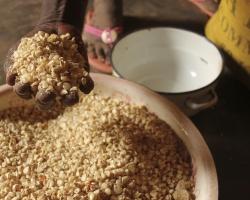As he dipped his fingers into a bowl of rice and beans, one of my students whined, “Why do you always have to mess with our food?”
At the time he made this comment, this student, along with the rest of our mission team, was busy participating in a team-building activity. During this activity, our team ate lunch from a common bowl without using silverware.
As you might have guessed from this student’s comment, this wasn’t the first time during our preparation process that I’d messed with our team’s food. In fact, teens now know that if I tell them “Lunch will be served,” something’s up.
Once I ordered a single pizza to feed our team of 17.
Another time, I asked students to bring their lunch. Then when they walked into our youth room, I confiscated it. A while later, I redistributed their lunches so no one ate the lunch he or she brought.
Messing with people’s food is more than a cruel joke.
For better or worse, food is deeply personal. Food elicits a wealth of emotions and strong opinions. When it comes to our food, we know what we like and what we don’t like. For these reasons, messing with people’s food is one of the best ways to prepare them for a mission trip abroad.
By not ordering enough food to feed your team adequately, you teach participants to make do (and be grateful) for whatever they receive. You teach them how to notice the small things to ensure that not just they, but their fellow team members and hosts are cared and provided for.
By giving teens a lunch they didn’t bring, you teach them how to be flexible, a trait every mission trip participant needs in order to thrive. You teach them how to manage their expectations and more importantly, how to deal with those times on the trip when their expectations aren’t met, when schedules or plans change. You teach them that life is an adventure—especially when it doesn’t go as planned—and that often it’s in those moments when things aren’t going as planned that we become acutely aware of God’s presence.
By making teens eat from a common bowl without first washing their hands, you force them to step outside their comfort zones. Once again, that’s something they’ll have to do on the mission field. You teach them how to adapt to and embrace cultural norms (such as eating with their hands) so that when they’re actually in that situation, they’re not bothered, distracted or frustrated. Instead, they’re able to see past what they previously found odd and now find value in the experience.
After our recent common-bowl meal, I walked into the women’s bathroom. There, I found one of my students recovering from the trauma of having to eat food she despised. A bit unsure as to how this student actually was doing, I asked, “You OK?”
With a slight smile on her face, she responded, “Now I know I can do this in Rwanda.”
That, friends, is why we mess with their food.
Without proper training, food actually can become one of the biggest stumbling blocks to adapting and thriving in new cultures. Yet, by messing with their food in advance, we equip teens for whatever they might face abroad. We instill in them a confidence that enables them to relax and be fully present in the moment, on the lookout for how God is moving in and among them. What’s more, we instill in them values that enable them to do short-term mission trips well.




